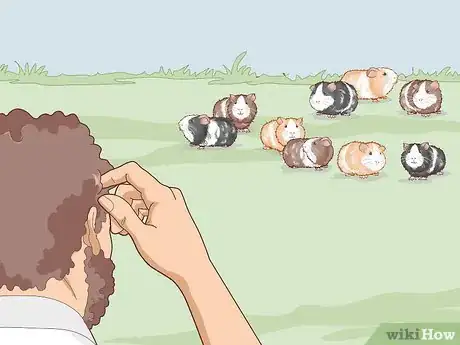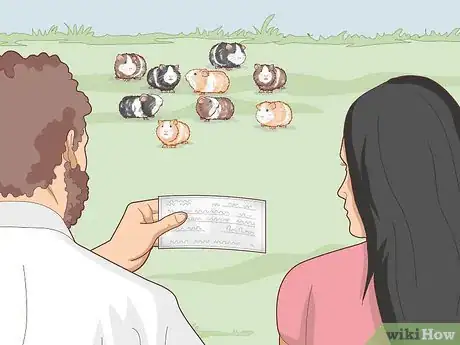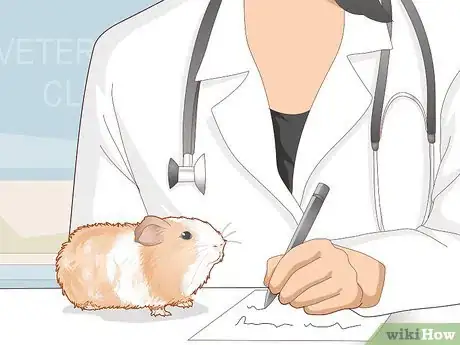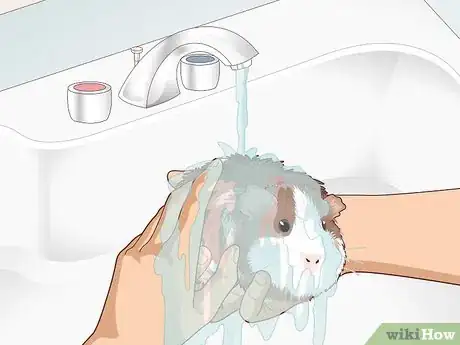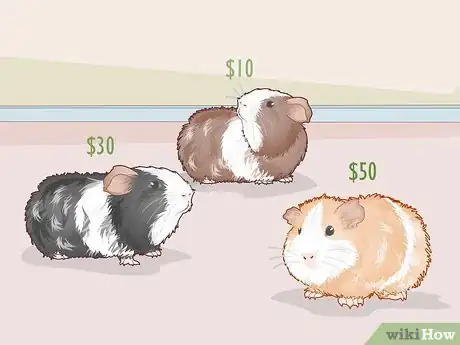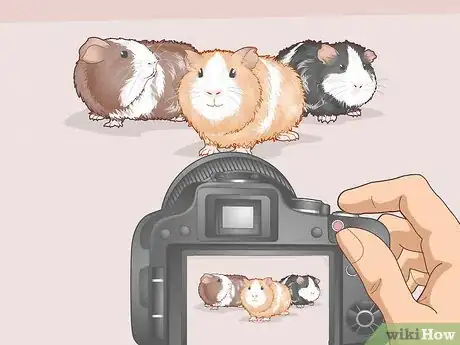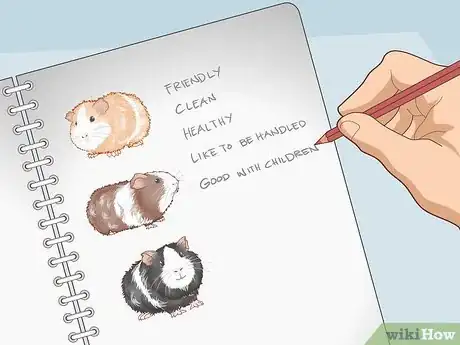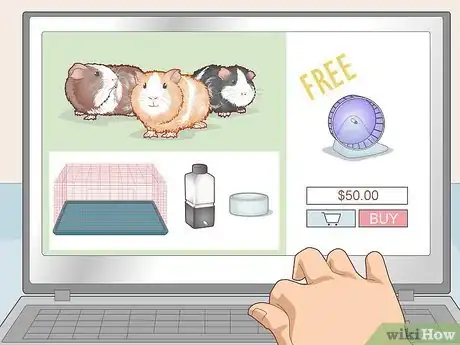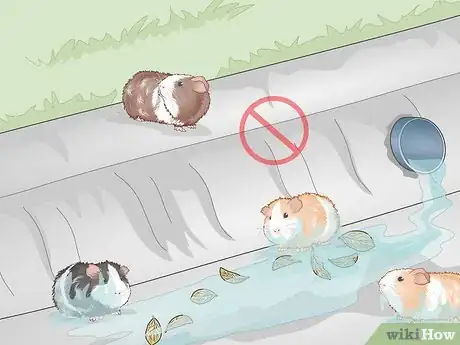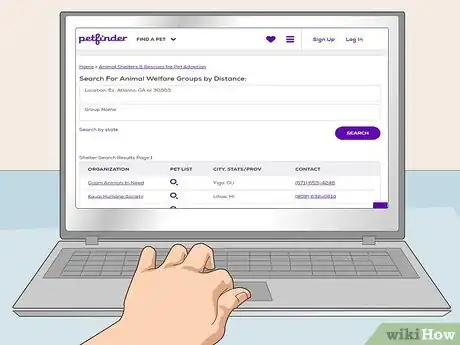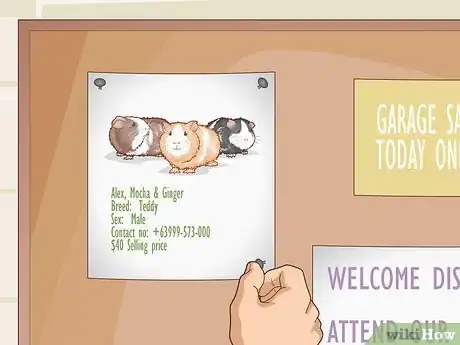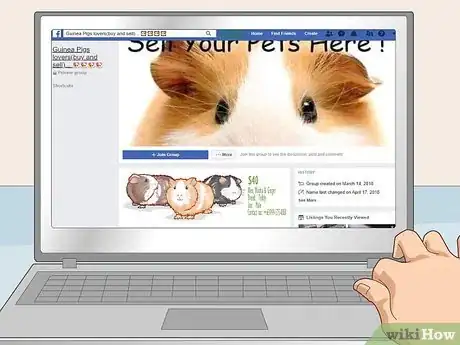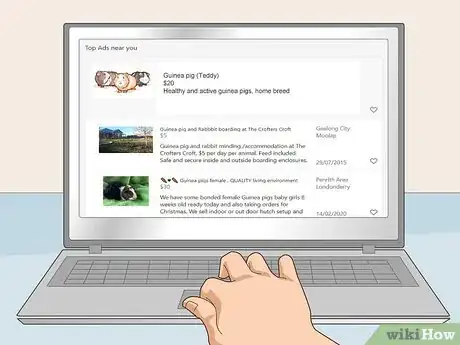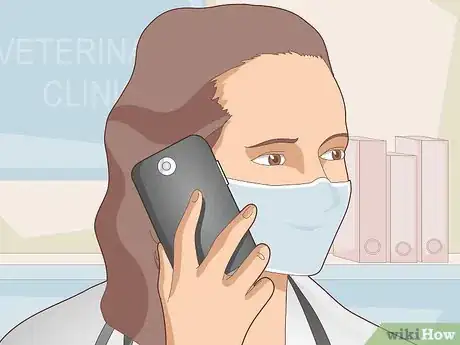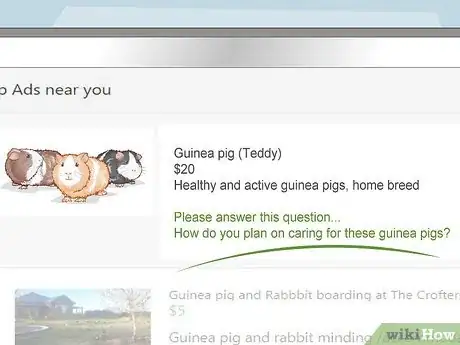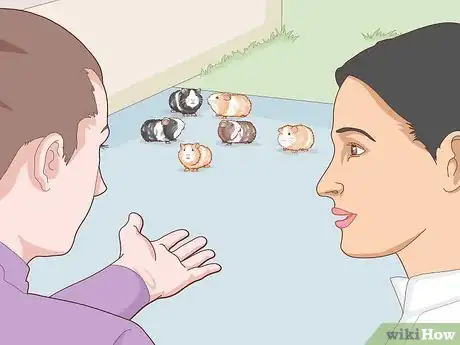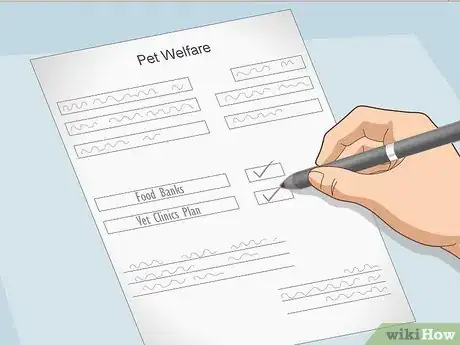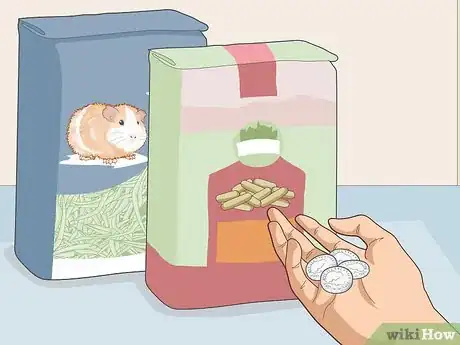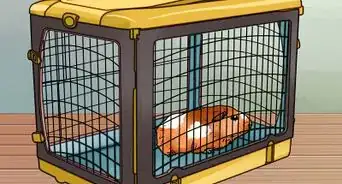X
wikiHow is a “wiki,” similar to Wikipedia, which means that many of our articles are co-written by multiple authors. To create this article, 22 people, some anonymous, worked to edit and improve it over time.
This article has been viewed 26,792 times.
Learn more...
Quite a few people jump into buying a guinea pig or two with the belief that they will be low-maintenance pets that require little care or commitment. However, they are quite the opposite and require just as much effort put in as you would with a cat or a dog. Unfortunately, a guinea pig won't fit into everyone's lifestyle. For that reason, this wikiHow article will take you step-by-step in finding a suitable and loving home for your guinea pig.
Steps
Part 1
Part 1 of 3:
Steps Prior to Advertising Your Guinea Pig
-
1Acknowledge why you want to rehome your guinea pig. Numerous rescues and adoption centres are flooded with guinea pigs that need new homes. This is primarily caused by backyard breeding. If you can, try to find a solution to the related issue you have with your guinea pig. Rehoming them should be a last resort.
-
2Find alternative solutions. There are several possibilities to make your pets fit into your lifestyle. If do not want to rehome your guinea pig, consider different solutions to resolve these reasons.
- If your landlord does not allow small animals, offer a pet deposit to alter their mind.
- Consider allergy medications for family members who are allergic.
- If you're worried about finances, you can always try budgeting
Advertisement -
3Get a sign off from a vet. Ensure your guinea pig is healthy and sickness-free. Arrange a quick appointment to have your guinea pig checked over by, if possible, a trained exotic vet. Since accidental sexing is a common issue, it's also helpful to get the sex of your guinea pig checked properly, and if possible, neuter them. A check-up fee for small animals generally costs about $30 US dollars.
- If your guinea pig is neutered and signed off by a veterinarian, rehoming them might be easier with the future owners knowing that the guinea pig is healthy and well cared for.
- Neutering approximately costs $100 US dollars, however, some programmes may be able to help you neuter your guinea pig with little to no cost. Check with your local animal shelter.
- If you desperately need to rehome your guinea pig and they are unwell, the RSPCA may be able to take them out of your hands depending on the seriousness of the issue. Otherwise, there are many rescues that would be glad to help.
-
4Clean your guinea pig. Give them a short bath and gently clean any dirt from around their eyes or ears. Be mindful that guinea pigs are sensitive and do not need regular cleaning. Use a pet-friendly shampoo that is marketed for small animals.
- Do not use dish soap, human, or cat/dog shampoo. The soap is too rough on their skin and may cause dry flakiness.
-
5Set a price for your guinea pig. Unless you are giving them up to the RSPCA, a rescue, pound or adoption centre, you should always set a price. This prevents your animals from going to impulse buyers that may potentially mistreat your pet, especially if you advertise on public forums such as Craigslist.
- $10 US dollars should be the minimum price, with the maximum being $50. However, the price is completely up to you and what you think fits. Take into consideration the country, sparsity of guinea pigs, their health, breed, and the average price in your area.
-
6Take pictures of your guinea pig. A photograph will help gain viewers and attention. Using a clear quality camera, take a picture of your guinea pig from either the front or the side.
- If you have more than one guinea pig, edit the pictures and caption them with the gender, name, and breed. This makes it easier for your viewers to understand which guinea pig is photographed.
-
7List your guinea pig's traits. Be upfront; never con someone into buying a guinea pig that isn't suitable for them. Guinea pigs are straightforward animals, so most have similar traits. You may want to add that your guinea pig is friendly, clean, healthy, likes to be handled, good with children, etc. Don't forget to also add their breed, name, and age.
-
8Offer your guinea pig's cage and supplies in the advertisement. New guinea pig owners that do not already have a set-up are more inclined to purchase guinea pigs with a clean, suitable cage at a small fee.
-
9Never dump your guinea pigs. Large herds of dumped guinea pigs are becoming highlighted issues among areas with overpopulation. If your guinea pig population is out of hand, do not dump your guinea pigs. You may face a fine and endanger not only your guinea pig's lives, but affect the habitat in that area. Contact an emergency shelter as soon as possible.
Advertisement
Part 2
Part 2 of 3:
Finding a New Home for Your Guinea Pig
-
1Research local rescues or animal shelters. Contact the rescue and find out if they take owner surrenders or if they would do a courtesy listing for you. Adoption centres may be the most satisfactory place to surrender your guinea pig, as they often perform free health checks and desex guinea pigs with little to no charge. Ensure that the rescue will not adopt out guinea pigs for breeding, testing/research, or as bait for other animals.
- Look on Google and Petfinder to see if there are any rescues close to you. Depending on where you live, you may have to take an hours drive to reach a rescue.
-
2Look into a breeder. If you know the blood-line of your guinea pig and have a desirable breed, such as a Teddy or Rex, a breeder may be interested.
- Texel, Rex, Teddy, Himalayan, and Skinny pigs are all desirable breeds.
- While breeds such as American short-hairs and Abyssians are common and less desirable, their colour variation may be a rare type that breeders will want to invest in.
-
3Locate local pin boards. Create a flyer of your guinea pig, including their name, breed, sex, and your contact details. You will need to add at least your phone number and a price of your guinea pig. Pin boards can be found in places such as a small shopping complex, community centres, grocery stores, libraries and coffee shops.
-
4Post on social media. Facebook is an effective way to advertise your pet. Try to find a group that accepts the sale of animals, and set a price, name, sex and breed of your guinea pig. Make sure your messaging is turned on so that buyers can privately message you for more information.
- Some private messages may be sent in a spam or request folder.
-
5Advertise online such as Craigslist or Gumtree. Set a minimum price of US $10, and add a photograph and description you made up earlier. However, be wary on sites like these; not all people are looking for new pets. You may attract impulse buyers, breeders, or someone who is looking for small bait animals. Always converse with the buyer beforehand.
- Put ads up either on the Petfinder Classifieds section (http://www.petfinder.com/classifieds/classifieds.html) or in a local veterinarian's office.
-
6Contact a vet clinic. Some clinics take in pets that are desperate for new homes. Otherwise, they might have a client that is interested in a new pet or know a place that accepts guinea pigs.
-
7Write up a screening questionnaire or adoption contract. This is to keep impulse buyers away or anyone who may potentially neglect your pet. Ensure the potential buyer is knowledgeable of guinea pig care and is happy to take them to a vet when needed.
- Screen potential adopters. Ask them basic questions about guinea pig care to define whether they are suitable pet owners.
Advertisement
Part 3
Part 3 of 3:
Finding Other Options
-
1Communicate with your landlord. If you are moving houses or have a new landlord, touch base with them. Try to persuade them to allow small animals on their property. Alternatively, offer to put down a pet deposit to keep your guinea pig.
-
2Apply for pet welfare. There are many charitable organisations that can help you take care of your pets. Food banks can dispense vegetables for your guinea pig, and modern vet clinics can set up a payment plan for vet bills.
- Pet fund is a charitable organisation that can help you with your vet bills.
-
3Budget to save on extensive bills. Most items, such as pellets, hay, and bedding, can be purchased in bulk. Explore different stores and compare prices. Farmer markets often sell cheaper fruits and vegetables too.
Advertisement
Warnings
- Avoid selling your guinea pig to a pet store or backyard breeder, as they will likely be kept in less than ideal conditions or be adopted out to an impulse buyer.⧼thumbs_response⧽
- Never release your guinea pig into the wild. It is cruel and it will not survive.⧼thumbs_response⧽
- As cruel as it sounds, some people will take free or cheap guinea pigs and feed them to other animals, eg, snakes. Be wary of who you are advertising to.⧼thumbs_response⧽
- Do not use dish soap, human, or cat/dog shampoo. The soap is too strong and will dry out your guinea pig's skin, causing flakiness.⧼thumbs_response⧽
Advertisement
References
- www.petfinder.com
- www.petrescue.com.au (Australian pet adoption listings)
About This Article
Advertisement
